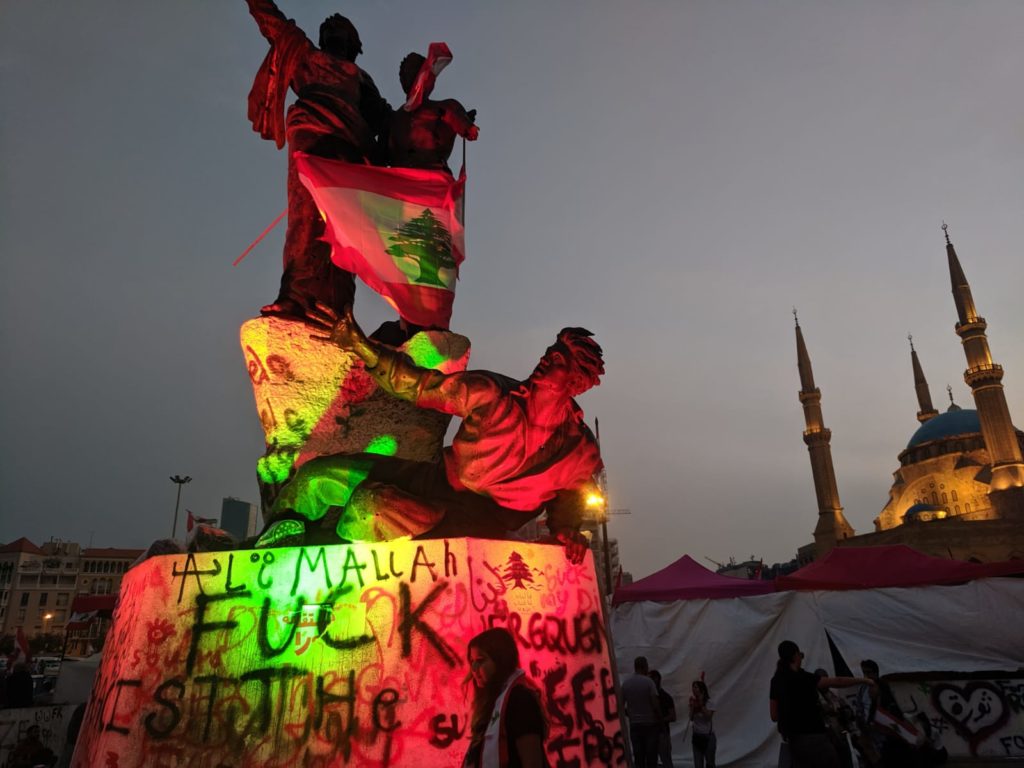by JOEY AYOUB & LAUSAN COLLECTIVE

Lausan Editor’s note: In 2019, simultaneous uprisings in Hong Kong and Lebanon led activists, organizers, and writers from these two locales to engage with and think about each other’s struggles. Lausan spoke to Lebanese activist, writer, and scholar Joey Ayoub about the ongoing protests, the resonances between our respective sites of struggle, and the possibilities for transnational solidarity.
This interview has been edited for structure and clarity. Read this article in Chinese.
‘The people want the downfall of the regime’: Lebanon in struggle
Lausan Collective (LC): Can you tell us a bit about why the protests in Lebanon began?
Joey Ayoub (JA): In Lebanon, there exists a system of sectarianism, which is essentially a power-sharing agreement between sectarian elites. The example usually given is how the president must be a Maronite Christian, the prime minister a Sunni Muslim and the speaker of parliament a Shia Muslim. This means that, unlike in Syria or Libya or Egypt or Tunisia, or indeed in Hong Kong, Lebanon has no dominant symbol of power. There’s no Assad, Gaddafi, Mubarak/Sisi or Ben Ali, and there’s no Xi Jinping and Chinese Communist Party (CCP).
What this means is that Lebanon is both stable and fragile at the same time. It has managed to withstand sectarian strife for the most part, even though conflicts have always existed; and people have never had an obvious, individual target to try to take down. And so when Egyptians, Syrians, Libyans, Tunisians and so on were calling for the downfall of the regimes in 2011, only a minority of people in Lebanon made the same demands.
In 2015, there was a brief period of mobilization during the “You Stink” protests in 2015, which was sparked by the closure of a major landfill and the piling up of trash on the streets of Beirut and Mount Lebanon, and which was more broadly a protest against corruption in the political system.
But our moment really came in 2019, when years of widespread corruption and disastrous economic policies resulted in a severe and ongoing financial crisis, exacerbated by the nearby Syrian civil war. Finally, on October 17th, thousands of protesters gathered up the courage to chant: “The people want the downfall of the regime.” The movement remains ongoing to this day.
Between Hong Kong and Lebanon: Temporal angst and fears of ‘disappearance’
LC: What first prompted you to think of the connections between the October Uprising in Lebanon and the anti-extradition protests in Hong Kong?
JA: Immediately after the protesters started, we began to see Hong Kong protest tactics playing out in Lebanon. Protesters began to use high-powered lasers and blinding lights to distract and confuse security forces—something they had never done before. We also learned how to neutralize tear gas based on tactics from Hong Kong.
What’s curious is that the Lebanon–Hong Kong parallels aren’t really new. Before and during the civil war (1975-1990), comparisons between Beirut and Hong Kong or Hanoi were not unheard of: it was sometimes said that Lebanon was being faced with the choice of being Hong Kong or Hanoi. For some people back then, Hong Kong, as a colonial outpost, was synonymous with capitalism and imperialism, whereas Hanoi was synonymous with socialism and anti-imperialism. Although this binary was always too simplistic, it actually created space for a segment of Lebanese and Palestinian leftists in Lebanon to link up with struggles in Vietnam.
Toward Freedom for more
